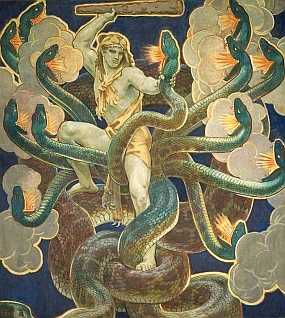In the first part of this limited series, I talked about how we Christians often make pronouncements that eliminate all genuine discernment. Today, I want to expand that post and note how easily we fall into ghettos of thinking that harm our ability to engage a dying world for the better.
As if perfectly anticipating this post, the following showed up online:
A recent article on the CNN website entitled, “More teens becoming ‘fake’ Christians,” drew my attention to a book written by Kenda Creasy Dean, a United Methodist minister and Princeton seminary professor. The author’s credentials, I have to admit, initially set off my alarm bells, signaling “liberalism alert.” Yet I am very, very glad I kept reading.
The author of that statement is the chancellor of the strongly evangelical Patrick Henry College, Michael Farris. His “Are We Becoming a Nation of ‘Fake’ Christians?” is worth reading.
Fact is, for the educated believer, plenty of articles are worth reading.
But you wouldn’t always know that from the way some Christians talk and act. The statement above that grieves me is this: “The author’s credentials, I have to admit, initially set off my alarm bells, signaling ‘liberalism alert.'”
Fortunately, Farris decided to keep reading.
But many Christians never get that far. Too many of us naturally assume that nothing “the other guys” have to say is worthwhile. We can’t learn anything from “them,” so let’s stick to “our” stuff and disengage the rest of the world.
If we want to know why our country is in trouble, this is one of the major reasons. We stick with a party line and never once ask if the other party has anything worthwhile to say. Simply granting that they may will get us labeled “traitor.”
Or “heretic” in Christian circles, which is about as low a label as a supposed believer can receive.
In those Christian circles, we just substitute different labels than the political ones. Let’s try a few and see how they read:
“The author’s credentials, I have to admit, initially set off my alarm bells, signaling ‘charismatic alert.'”
“The author’s credentials, I have to admit, initially set off my alarm bells, signaling ‘Calvinist alert.'”
“The author’s credentials, I have to admit, initially set off my alarm bells, signaling ‘Emergent alert.'”
Now some may consider the above overkill, yet every day I read blogs written by Christians of one sect/denomination/belief or another, and this kind of thing goes on all the time. Instead of adding “Yet I am very, very glad I kept reading,” the conversation stops right there.
The reasoning? Discernment.
But stopping right there and blaming an inability to engage the ideas of someone who thinks differently from us is not discernment.  It’s small-mindedness. In truth, it’s a form of willful ignorance.
It’s small-mindedness. In truth, it’s a form of willful ignorance.
Worse, the tendency is to fall into a perpetual state of ridicule. Some people DO keep reading, if only to add more grist for their predisposed mill.
The problem is that people who think differently from us, even Christians who think differently from us, may still have valid points we need to consider. No one is wrong on everything. Ignoring those who think differently or lampooning their most obvious errors without considering areas in which they may be correct (because that would get us labeled “soft” or something worse) is the height of spiritual pride and sloth. It is in no way being discerning.
Somehow, Paul was able to wade into the very midst of the philosophers and speak to them about Christ, even using some of their own illustrations to do so. Somehow.
Wouldn’t it be great if…
…the charismatic open-mindedly read Dietrich Bonhoeffer?
…the Calvinist open-mindely read Watchman Nee?
…the Emergent open-mindedly read John MacArthur?
Wouldn’t it?
Instead, we increasingly see people retreating to their own little ghettos of thought and practice, and the conversation either gets more shrill or it ceases altogether. When that occurs, problems go unsolved, community dies, and everyone retreats to his or her own bunker.
People who think differently than I do have helped shaped my Christian walk for the better. If it were not for them challenging the established way I thought, I wouldn’t be the Christian I am now. And the only way I got that bettering was by engaging hard and radical ideas that put my existing belief system under a microscope.
Yes, that’s scary. Yes, that raises the potential that my carefully crafted persona of perfection will come crashing down. Fact is, for most of us, that persona does need to come crashing down. We all need to admit that we could stand to learn a few things. We all need much more humility.
The worst thing we Christians can do to our perceived foes in the public square is to call for their silence, to stick our fingers in our ears, or to resort to shouting them down. None of that shows any discernment. It’s just childish.
Francis Schaeffer wrote extensively that we Christians cannot be afraid of ideas. We must also not be afraid of genuine truth that may show holes in our own beliefs, even if those truths come from “the other guys.” Our holes don’t necessarily mean that we are wrong, only that greater truths and understandings exist, and we must understand them for what they are and how they may help us bolster our own understanding of what is true, honorable, just, pure, lovely, commendable, excellent, and worthy of praise.

 It is one thing to live for the day, but quite another to live for the day so eternity is richer.
It is one thing to live for the day, but quite another to live for the day so eternity is richer.